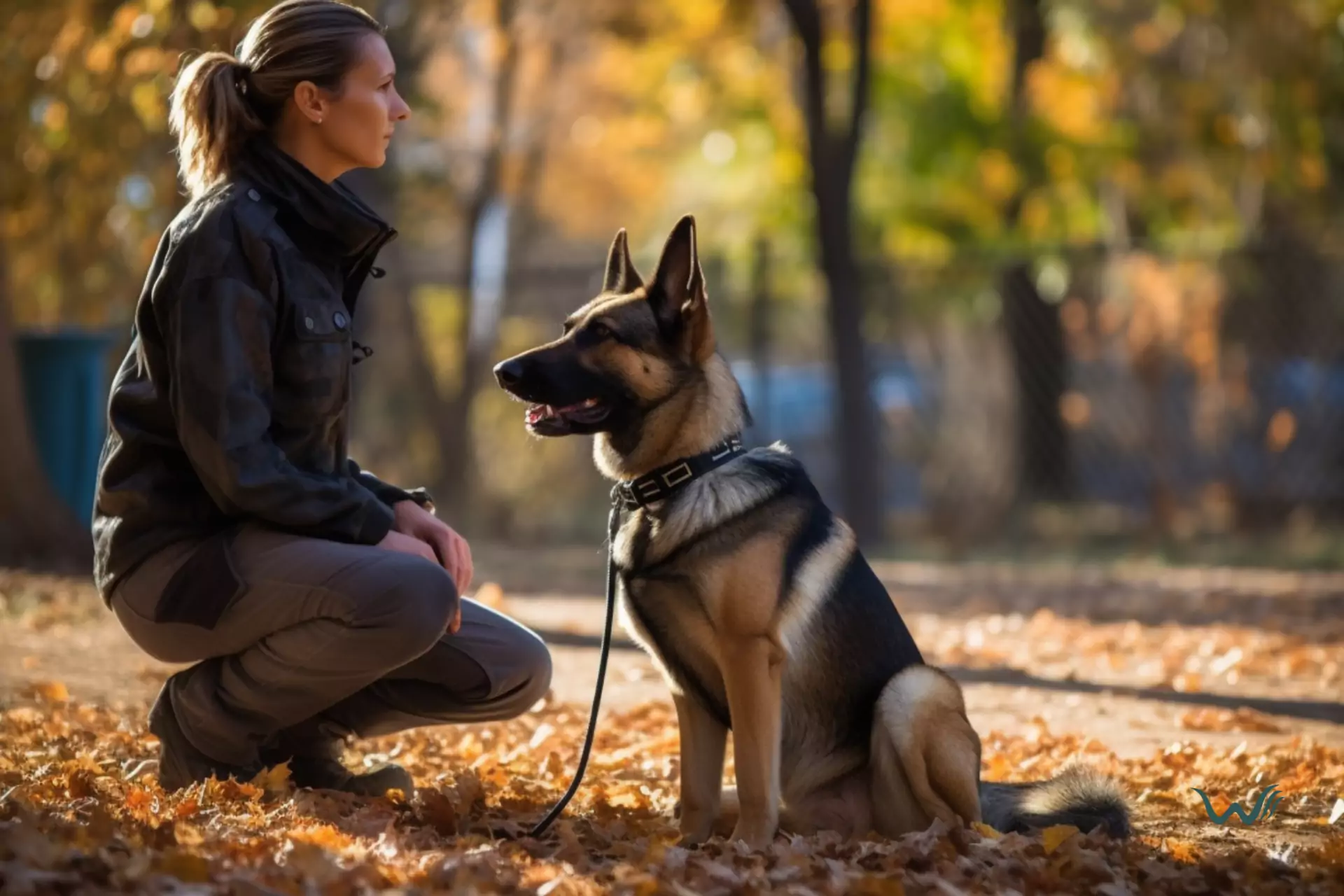

Achieving Success With Reward-Based Puppy Training
by Ayesha Aziz
Last updated: April 16, 2024
Verified and Approved by:
Angela Morris,
MSW, LCSW
Fact Checked

Are you ready to embark on the exciting journey of puppy training? If so, you’re in the right place!
In this article, we will explore the world of reward-based puppy training and how it can lead to success in shaping your furry friend’s behavior. Imagine the joy and satisfaction of having a well-behaved, happy, and obedient pup by your side – a true companion who brings joy to your life and others.
With the power of positive reinforcement and a consistent routine, you can achieve this dream and more. Puppy training is not just about teaching your furry friend basic commands; it’s about building a strong bond and trust between you and your pup.
By using reward-based training techniques, you are tapping into your dog’s instincts and desire to please you. Positive reinforcement, such as treats, praise, and play, becomes a powerful tool in shaping your puppy’s behavior.
This gentle and effective approach not only motivates your pup to learn but also strengthens the bond between you. So, get ready to dive into the world of reward-based puppy training, where you will discover the joy of guiding your pup towards success while serving their needs and desires.
Key Takeaways
- Positive reinforcement is the foundation of reward-based puppy training, focusing on encouraging desired behaviors through treats, praise, and affection.
- Setting clear expectations and boundaries is crucial in puppy training to establish consistent rules and routines.
- Consistency and patience are key in puppy training, as it takes time for puppies to learn and develop new behaviors.
- Socializing is important for puppies to develop social skills and confidence, helping them become well-rounded and adaptable dogs.
Understanding the Basics of Puppy Training
Want to train your puppy successfully? Understand the basics of puppy training with reward-based methods!
Reward-based training is a positive and effective way to teach your puppy new behaviors and reinforce good habits. Instead of using punishment or dominance-based techniques, reward-based training focuses on positive reinforcement to encourage desired behaviors. By using treats, praise, and other rewards, you can motivate your puppy to learn and make training a fun experience for both of you.
One of the key principles of reward-based training is to set clear expectations and boundaries for your puppy. Start by teaching them basic commands like sit, stay, and come. Use treats or toys as rewards when they correctly respond to your commands. Make sure to use a clear and consistent verbal cue for each command, and reward your puppy immediately after they perform the desired behavior. This will help them understand what you expect from them and what will earn them a reward.
In addition to rewards, it’s important to be patient and consistent in your training efforts. Puppies have short attention spans, so keep training sessions short and frequent. Practice the commands in different environments to help your puppy generalize their learning.
So start training your puppy with rewards and watch them blossom into a well-behaved and happy companion!
Utilizing Positive Reinforcement Techniques
By utilizing positive reinforcement techniques, you can easily teach your puppy new tricks and behaviors while creating a joyful training experience. Positive reinforcement involves rewarding your puppy with treats, praise, and affection when they exhibit the desired behavior. This method focuses on encouraging and reinforcing good behavior rather than punishing or scolding for mistakes.
When training your puppy, it’s important to be consistent and patient. Start by identifying the behaviors you want to teach and break them down into small, manageable steps. For example, if you want to teach your puppy to sit, begin by rewarding them for simply bending their knees. Gradually increase the criteria for the reward, until they are consistently sitting on command.
Using positive reinforcement not only helps your puppy learn new behaviors, but it also strengthens the bond between you and your furry friend. By focusing on the positive and creating a joyful training experience, you are serving your puppy’s needs for love, attention, and mental stimulation.
What Are The Pet Policies For The Top U.S. Airlines?
Establishing a Consistent Routine
To establish a consistent routine for your furry friend, you need to start with a clear and structured daily schedule. This will not only help your puppy develop good habits but also create a sense of stability and security for them.
Here are some steps you can take to establish a routine that will benefit both you and your puppy:
- Set specific times for meals: Dogs thrive on routine, so it’s important to feed them at the same times every day. This will help regulate their digestion and prevent accidents in the house.
- Plan regular exercise sessions: Puppies have lots of energy to burn, so it’s crucial to provide them with regular exercise. Whether it’s a walk around the neighborhood or a play session in the backyard, make sure your puppy gets enough physical activity to keep them healthy and happy.
- Schedule potty breaks: Potty training is an essential part of puppyhood, and establishing a routine for bathroom breaks is key. Take your puppy outside to their designated potty spot at regular intervals throughout the day, such as after meals, naps, and playtime.
- Create designated rest times: Just like humans, puppies need rest too. Set aside specific times during the day for your puppy to take naps or relax in their crate or designated sleeping area. This will help prevent overstimulation and ensure they get the rest they need to grow and develop.
By following these steps and sticking to a consistent routine, you will not only provide structure for your puppy but also set them up for success in their training and overall well-being.
Socializing Your Puppy
Make sure your puppy gets plenty of opportunities to interact with other dogs and people to help them develop their social skills. Socializing your puppy is an important part of their training and overall development.
By exposing them to different environments and experiences, you’re helping them become well-rounded and confident dogs.
One way to socialize your puppy is by taking them to a dog park or a puppy playgroup. This allows them to interact with other dogs in a controlled and supervised environment. It’s a great way for them to learn how to communicate and play with other dogs, as well as how to navigate social situations.
In addition to interacting with other dogs, it’s important to expose your puppy to different people as well. This can include friends, family members, and even strangers. By doing so, you’re helping them become comfortable and confident in various social settings. Encourage people to gently interact with your puppy, allowing them to be touched and handled. This will help them develop trust and become more at ease around people.
Reward-based training can be used to reinforce positive behaviors and help your puppy understand what’s expected of them. By consistently rewarding good behavior, you’re setting them up for success and helping them develop good social skills.
Troubleshooting Common Training Challenges
If your pup is acting up during training sessions, it’s time to troubleshoot those common challenges and find a solution.
One common challenge is when your puppy gets distracted easily. They may lose focus and start exploring their surroundings or chasing after a squirrel. To address this, try finding a quiet and distraction-free training area. Remove any toys or objects that may tempt your pup to wander off. Keep the training sessions short and engaging, using high-value treats or toys as rewards. By keeping your pup’s attention focused on you and the training, you can gradually increase the difficulty level and introduce distractions in a controlled manner.
Another common challenge is when your puppy becomes stubborn and refuses to follow commands. This can be frustrating, but it’s important to stay patient and positive. Instead of getting angry or forceful, try to understand why your pup is being stubborn. Are they tired, hungry, or maybe feeling anxious? Addressing their needs first can make a big difference in their willingness to cooperate.
Additionally, make sure you are using clear and consistent commands, and rewarding your pup immediately when they respond correctly. Break down the desired behavior into smaller steps and gradually increase the difficulty.
Frequently Asked Questions
How long does it typically take for a puppy to fully understand and respond to reward-based training methods?
It typically takes a few weeks for a puppy to fully understand and respond to reward-based training methods. With consistent practice and positive reinforcement, you’ll see progress and a stronger bond with your furry friend.
Are there any specific breeds or types of puppies that may require different approaches or techniques when using reward-based training?
Yes, breeds like Border Collies or Australian Shepherds may need more mental stimulation and variety in rewards due to their high intelligence. Breeds like Bulldogs or Basset Hounds may benefit from shorter training sessions with more tangible rewards to keep them motivated.
Can reward-based training be effective for older puppies or adult dogs, or is it primarily meant for younger puppies?
Reward-based training can be effective for older puppies and adult dogs. By using positive reinforcement, you can motivate them to learn new behaviors and strengthen their bond with you. It’s never too late to start training!
Is it necessary to use treats as rewards in reward-based training, or are there other types of rewards that can be equally effective?
You don’t have to stick to treats alone in reward-based training. Think of rewards like a colorful palette of possibilities – praise, toys, playtime, or even a belly rub. Let your pup’s joy be your guide!
Are there any potential drawbacks or limitations to using reward-based training, and are there any situations where it may not be the most suitable approach?
Sometimes, reward-based training may not be suitable for every situation. It may not work well if a dog is not motivated by treats or if they have a high prey drive. Understanding your dog’s individual needs is key.
Certify Your Emotional Support Animal Today

Why You Can Rely on Us?
At Wellness Wag, we believe your pet deserves care rooted in both science and compassion. Each article is carefully researched, written in clear language for pet owners, and then reviewed by qualified professionals to ensure the information is evidence-based, current, and practical for real-life care. Our goal is to help you feel confident in making informed decisions about your pet’s health and well-being.
Reviewed by
Angela Morris, MSW, LCSW
Angela is a licensed clinical social worker with 20 years of experience in patient advocacy and community mental health. She has assisted numerous clients with ESA evaluations and brings a deep understanding of disability accommodations, ensuring that all information is accurate, supportive, and practical.

Written by :
Ayesha Aziz
Last Updated :
April 16, 2024










